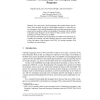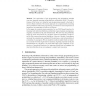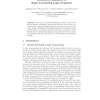1020 search results - page 25 / 204 » Tight Semantics for Logic Programs |
143
Voted
RULEML
2004
Springer
15 years 8 months ago
2004
Springer
Abstract. We extend Answer Set Programming with, possibly infinite, open domains. Since this leads, in general, to undecidable reasoning, we restrict the syntax of programs, while...
103
click to vote
LPNMR
2005
Springer
15 years 8 months ago
2005
Springer
Two approaches to logic programming with probabilities emerged over time: bayesian reasoning and probabilistic satisfiability (PSAT). The attractiveness of the former is in tying ...
110
click to vote
LOPSTR
2004
Springer
15 years 8 months ago
2004
Springer
Most logic programming languages actually provide some kind of dynamic scheduling to increase the expressive power and to control execution. Input consuming derivations have been i...
160
Voted
WLP
2007
Springer
15 years 8 months ago
2007
Springer
Answer-set programming (ASP) is an emerging logic-programming paradigm that strictly separates the description of a problem from its solving methods. Despite its semantic elegance,...
118
Voted
AAAI
1993
15 years 3 months ago
1993
Automating the construction of semantic grammars is a di cult and interesting problem for machine learning. This paper shows how the semantic-grammar acquisition problem can be vi...



